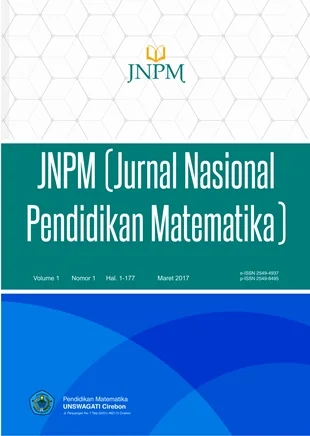Pengaruh Penerapan Pembelajaran Scientific Method Terhadap Kemampuan Pemahaman Konseptual Dan Kemandirian Belajar
DOI:
https://doi.org/10.33603/jnpm.v9i2.10440Keywords:
Matematika, Pemahaman matematis, Model PembelajaranAbstract
The objective of this study is to determine the effect of implementing the scientific method on students’ conceptual understanding and learning independence in mathematics. This study employs a quantitative approach with a quasi-experimental design. Using purposive sampling, the sample consisted of 78 students from Grade XI of SMK Negeri 2 Pandeglang majoring in Laboratory Management Analysis (APL), with 36 students in the experimental class and 32 students in the control class. The instruments used in this study were written tests and questionnaires. Data analysis techniques included ANOVA (Analysis of Variance) and MANOVA (Multivariate Analysis of Variance). The results showed that students who were taught using the scientific method had significantly higher conceptual understanding and learning independence (p < 0.05), with a very large effect size (d ≥ 2.00), compared to students who were taught using conventional methods.
References
Ardaya, D. A. (2016). Penerapan Pendekatan Saintifik Untuk Meningkatkan Pemahaman Konsep Materi Ipa Siswa Sekolah Dasar. Jurnal Pendidikan Guru Sekolah Dasar, 1(1), 72–83.
Bahri, S. (2020). The Application of Blended Learning Method using Scientific Approach in Physics Curriculum Study II Course. Jurnal Pendidikan Fisika, 8(1), 1–12. https://doi.org/10.26618/jpf.v8i1.2608
Banjaranyar, D. I. S. D. N. (2024). Terhadap Kemandirian Belajar Siswa Kelas V. 1(2), 77–89.
Hiebert, J., & Grouws, D. A. (2007). The Effects of Classroom Mathematics Teaching on Students’ Learning. Second Handbook of Research on Mathematics Teaching and Learning, 371–404.
Jehadus, E., Tamur, M., Jelatu, S., Pantaleon, K. V., Nendi, F., & Defrino, S. S. (2020). Journal Of Educational Experts (JEE), 3(2), 53. https://doi.org/10.30740/jee.v3i2p53-59
Kadarisma, G. (2017). Meningkatkan Kemandirian Belajar Siswa Smp Dalam Matematika Dengan Menggunakan Pendekatan Saintifik. Symmetry: Pasundan Journal of Research in Mathematics Learning and Education, I, 61–66. https://doi.org/10.23969/symmetry.v1i1.214
Laksono, R. K. S., Nurcahyo, H., & Wibowo, Y. (2023). Penerapan e-book berbasis socio-scientific issues dalam meningkatkan kemandirian belajar pada materi sistem sirkulasi darah. JINoP (Jurnal Inovasi Pembelajaran), 9(1), 58–69. https://doi.org/10.22219/jinop.v9i1.22843
Lupiyoadi. (2014). Daftar Pustaka Daftar Pustaka. Pemikiran Islam Di Malaysia: Sejarah Dan Aliran, 20(5), 40–43. https://books.google.co.id/books?id=D9_YDwAAQBAJ&pg=PA369&lpg=PA369&dq=Prawirohardjo,+Sarwono.+2010.+Buku+Acuan+Nasional+Pelayanan+Kesehatan++Maternal+dan+Neonatal.+Jakarta+:+PT+Bina+Pustaka+Sarwono+Prawirohardjo.&source=bl&ots=riWNmMFyEq&sig=ACfU3U0HyN3I
Nurfadilah, S., & Lukman Hakim, D. (2019). Kemandirian Belajar Siswa Dalam Proses Pembelajaran Matematika. Prosiding Seminar Nasional Matematika Dan Pendidikan Matematika Sesiomadika 2019, 1214–1222.
Putri, K., & Irmawita, I. (2023). the Relationship Between the Application of the Problem Method Based Learning With Participant Learning Outcomes Computer Course At Smart College Padang. KOLOKIUM Jurnal Pendidikan Luar Sekolah, 11(3), 425–431. https://doi.org/10.24036/kolokium.v11i3.681
Rittle-Johnson, B., & Schneider, M. (2014). Developing Conceptual and Procedural Knowledge of Mathematics. The Oxford Handbook of Numerical Cognition, 1118–1134. https://doi.org/10.1093/oxfordhb/9780199642342.013.014
Sabina, F. (2019). Penerapan Discovery Learning Dengan Pendekatan Scientific Dalam Meningkatkan Kemampuan Pemahaman Konsep dan Kemampuan Penalaran Matematis serta Dampaknya Terhadap Self Regulated Learning Siswa SMP. Jurnal Madani : Ilmu Pengetahuan, Teknologi, Dan Humaniora, 2(2), 201–215. https://doi.org/10.33753/madani.v2i2.52
Schuchardt, A. M., & Schunn, C. D. (2016). Modeling Scientific Processes With Mathematics Equations Enhances Student Qualitative Conceptual Understanding and Quantitative Problem Solving. Science Education, 100(2), 290–320. https://doi.org/10.1002/sce.21198
Siswanto, Yusiran, & Fajarudin, M. F. (2016). Keterampilan Proses Sains dan Kemandirian Belajar Siswa: Profil dan Setting Pembelajaran untuk Melatihkannya. Gravity, 2(2), 190–202.
Sofianti, F., & Afrilianto, M. (2021). Penerapan Pendekatan Saintifik untuk Menumbuhkan Kemandirian Belajar Pada Siswa SMK Kelas XI. Jurnal Pembelajaran Matematika Inovatif, 4(3), 667–674. https://doi.org/10.22460/jpmi.v4i3.667-674
Solahudin, I. (2019). Pengaruh Model Pembelajaran dan Kemandirian Belajar Terhadap Pemahaman Konsep Matematika. METATIKA: Jurnal Pendidikan Matematika, 1(2), 12–24.
Sulisworo, D., & Sutadi, N. (2017). Science Learning Cycle Method to Enhance the Conceptual Understanding and the Learning Independence on Physics Learning. International Journal of Evaluation and Research in Education (IJERE), 6(1), 64. https://doi.org/10.11591/ijere.v6i1.6348
Taşar, M. F., Editor, S., Flick, B. L. B., & Eds, N. G. L. (2008). Book Reviews SCIENTIFIC INNQUIRY AND NATURE OF. 4(2), 191–193.
Ulia, N. (2016). Peningkatan Pemahaman Konsep Matematika Materi Bangun Datar dengan Pembelajaran Kooperatif Tipe Group Investigation dengan Pendekatan Saintifik di SD. Jurnal Tunas Bangsa, 3(11), 56–68.
Yani, V. P., Haryono, Y., & Lovia, L. (2022). Hubungan Pemahaman Konsep Matematis dengan Kemandirian Belajar Siswa pada Kelas VIII SMP. Plusminus: Jurnal Pendidikan Matematika, 2(3), 439–448. https://doi.org/10.31980/plusminus.v2i3.1118
Published
Issue
Section
License
Copyright (c) 2025 JNPM (Jurnal Nasional Pendidikan Matematika)

This work is licensed under a Creative Commons Attribution-ShareAlike 4.0 International License.
Penulis yang menerbitkan karyanya ke jurnal ini setuju dengan persyaratan berikut:
Penulis menyerahkan hak cipta dan memberikan hak penerbitan pertama kepada jurnal, dengan karya yang secara serentak dilisensikan di bawah Lisensi: Creative Commons Attribution - Share Alike 4.0 Internasional License yang memungkinkan orang lain membagikan karya dengan pengakuan penerbitan awal dan kepenulisan karya di jurnal ini.










